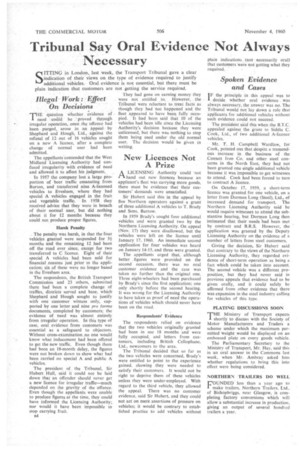Spoken Evidence and Cases
Page 38

If you've noticed an error in this article please click here to report it so we can fix it.
TE the principle in this appeal was to I decide. wbether. oral evidence was always necessary, the answer was no. The Tribunal would not: lay down a rule that applicants for additional. vehicles without such evidence could not succeed.
The president .said this when the B.T.C. appealed against the grant to Siddle C. Cook, Ltd., of two additional A-licence vehicles.
Mr. T. H. Campbell Wardlaw, for Cook, pointed out that despite a tremendous increase in the business of the ,Consett Iron Co. and other. steel concerns in. the North East, they had not been granted one single additional vehicle because it was impossible to get witnesses to attend. Cook had been forced to turn to contract A licence.
On October 17, 1959, a short-term licence was granted for one vehicle, on a letter from Dorman Long (Steel), Ltd., of increased demand for transport. The Northern Licensing Authority said he would require witnesses to attend the substantive hearing, but Dorman Long then intimated that their needs had been met by contract and B.R.S. However, the application was granted by the Deputy Licensing Authority on the evidence of a number of letters from steel customers.
Giving the decision, Sir Hubert said that contrary to the views of the Northern Licensing Authority, they regarded evidence of short-term operation as being a fact which could be taken into account. The second vehicle was a different proposition, but they had never said in previous appeals that evidence had to be given orally, and it could safely be affirmed from other evidence that there was expansion in the steel industry calling for vehicles of this type.
























































































































